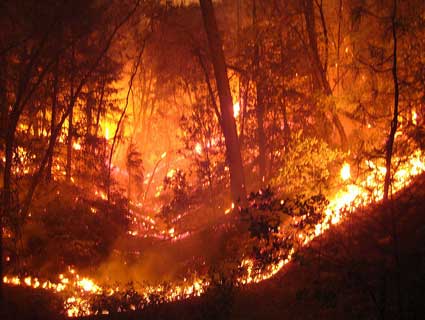Traveling the country with Climate Desk this year, I’ve met a fascinating and diverse group of people affected by climate change in one way or another: drought-ravaged ranchers, wildfire survivors, algae farmers, and activists. As November 6th approaches, I thought it would be interesting to check back with this cast of Climate Desk characters and ask, “What do you think of the presidential campaign?” and “Are you disappointed by the campaigns’ climate silence?” Climate Desk’s Chris Mooney has done a great job analyzing why the C-word was never uttered during the presidential debate season. The edited extracts below show how voters who have been touched by climate change have reacted to that silence.
Martha Carlson: Maple Syrup Farmer and Scientist, New Hampshire

I first met Martha in December 2011, on her beautiful 60-acre “sugar bush” in Sandwich, New Hampshire. The 65-year-old maple farmer’s trees were dying. The culprit: climate change.
Martha: After the stonewalling Congress gave him, I don’t blame Obama for not mentioning climate change. He would have only reaped more abuse and resistance. But now, if he wins, I hope he will address climate change head on. I see businesses, small towns and cities and ordinary citizens all looking at the issue—even if it’s not named—to get a better car, to build bigger culverts, to make heating costs more efficient. So we the people are already responding to climate change.
Andrew Greene: Algae Farmer, New Jersey

Entrepreneur Andrew Greene gave Climate Desk a tour of his futuristic New Jersey algae factory in March in response to President Obama’s “all of the above” energy policy.
Andrew: I don’t think we’re going to get support from the Department of Energy, although I’d like to, or even the Department of Agriculture. There’s just not a lot of money. And whether Obama wins or Romney wins, I don’t think that’s going to change. I think we have a better chance from Obama, if he wins, to put in for some research to look at what we’re doing. And clearly if Romney is president, he’s already talking coal and oil, the same old fossil fuels as before. And it will make it more difficult. But we are not counting on any outside support.
Hani Ahmad: Wildfire Survivor, Colorado

The Waldo Canyon Fire reduced Hani’s family home of two decades to a hole in the ground. Eating away at his thoughts was the nagging idea that ignoring climate change is increasing the threat of similar fires in the West.
Hani: I’m disappointed with Obama. But I’m certainly going to vote for him. They mentioned a little bit about climate change at the convention, at least it’s not a hoax! He mentioned even things like wildfires, and I thought that was somewhat encouraging. But I think he’s playing it very close to the vest in terms of really making that an issue in this campaign, because there’s so much money, so much resistance against even talking about it. That’s all I want—an honest debate. And I think that’s not really happening, and I think the election is actually pushing us away from it rather than towards it, because it’s so risky for him to bring it up. Climate change will be dead in the water if Romney wins.
Beth Henry: Anti-Coal Campaigner, North Carolina

Climate Desk visited Maiden, North Carolina, for a close-up view of what will soon be one of the world’s biggest data centers—owned by Apple and powered by the coal-heavy power behemoth Duke Energy. Beth Henry was one of our guides.
Beth: Like a lot of folks, I’m very disappointed that climate hasn’t been talked about at all in the debates. Or even in the campaigns. I’m honestly convinced it’s the most serious economic and national security issue we face and we’re not even talking about it. No matter who wins, I’m just afraid the fossil fuel companies have so much money and power that we’ve just got to build a much bigger grass-roots movement in order to get the change that’s needed. I do think the weather impacts of climate are becoming hard to deny. As we have more weather disasters that are fueled by climate change, I do think there a lot of good people in North Carolina, that when they are forced out of their denial will want to do the right thing for their children and their grandchildren. I just hope they wake up in time. I’d like to say I’m hopeful, but I’m certainly not optimistic, at all.
Farrell Seiler: New Hampshire Republicans for Climate, New Hampshire

Farrell is a Republican who believes that climate change is real, and a serious threat. I met him before the New Hampshire primary last year, as he convened a conference for like-minded Republican voters. This time, he says, he’s voting for Obama.
Farrell: Climate change is not an issue that should be trumped by partisan affiliation, or denialism. I think that the Republicans are running the risk of losing a generation of people who are going to be affected by climate change, by simply ignoring it entirely. I listened to the debate on Tuesday night, and I was naturally disappointed that climate change was never even mentioned, when it could have been mentioned as a national security issue. One of the things that really irks me about Romney, is that he talks about job creation and the economy as central campaign issues. But let me go back 30 years: The birth of the modern wind farm was here in New Hampshire, and we have a very vibrant industry in wind energy in the United States, particularly in states like Iowa, Colorado, even Nevada. And for Mitt Romney to get out there and say he wants to end the Production Tax Credit for renewables and wind in particular, it’s kind of silly.
See all of Climate Desk’s videos on our YouTube page.
















